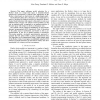Free Online Productivity Tools
i2Speak
i2Symbol
i2OCR
iTex2Img
iWeb2Print
iWeb2Shot
i2Type
iPdf2Split
iPdf2Merge
i2Bopomofo
i2Arabic
i2Style
i2Image
i2PDF
iLatex2Rtf
Sci2ools
135
Voted
CDC
2009
IEEE
2009
IEEE
A simulation-based method for aggregating Markov chains
— This paper addresses model reduction for a Markov chain on a large state space. A simulation-based framework is introduced to perform state aggregation of the Markov chain based on observations of a single sample path. The Kullback-Leibler (K-L) divergence rate is employed as a metric to measure the distance between two stationary Markov chains. Model reduction with respect to this metric is cast as an infinite-horizon average cost optimal control problem. In this way an optimal policy corresponds to an optimal partition of the state space with respect to the K-L divergence rate. The optimal control problem is simplified in an approximate dynamic programming (ADP) framework: First, a relaxation of the policy space is performed, and based on this a parameterization of the set of optimal policies is introduced. This makes possible a stochastic approximation approach to compute the best policy within a given parameterized class. The algorithm can be implemented using a single sample...
Related Content
| Added | 21 Jul 2010 |
| Updated | 21 Jul 2010 |
| Type | Conference |
| Year | 2009 |
| Where | CDC |
| Authors | Kun Deng, Prashant G. Mehta, Sean P. Meyn |
Comments (0)

